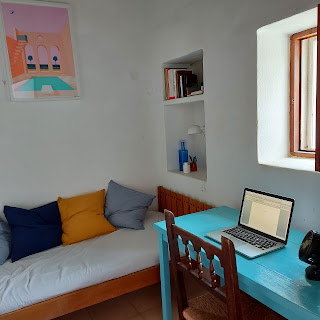CREATIVE SECRETS Sophie Cameron
 |
Tell us about your creative space.
Your creative tools - what are they and why ?
I mostly just use Microsoft Word, but if I’m doing structural edits or have a plot point to untangle I sometimes like to write them out and move them around on post-its. It’s a good procrastination technique, if nothing else.
Do you have a routine?
I have two toddlers, so right now I just fit writing in whenever I can. I usually manage to get an hour or so done while they’re napping and another hour or so at night if I’m not too tired, but it changes all the time. I used to love getting up early to write though, so I’m hoping to get back to that eventually. Maybe when they’re teenagers!
Do you need particular prompts or rituals to get started?
I have no rituals at all but for certain projects I find that a good playlist can set the tone I’m going for and help me to get into the zone.
What is the best creative advice you’ve been given?
Before being published, I went to a workshop led by Juno Dawson where she advised us to think of ourselves as authors – not “aspiring” authors, but authors. It really changed the way I viewed my writing. I started taking it (and myself) more seriously, and that helped me to focus and make sure I put aside time to write.
What advice would you like to give to writers/illustrators who are trying to get established?
I’d say the same, to take your writing seriously and to try to weave it into your routine if you haven’t already done so. For novelists, I’d also encourage them to finish their drafts as much as possible – it took me years to finally finish a manuscript because I kept abandoning projects for shiny new ideas, and I’d probably still be stuck in that loop if I hadn’t had to finish my first novel when I was shortlisted for a competition.
What was your favourite book as a child?
I had so many, but Skellig by David Almond and Phillip Pullman’s His Dark Materials were particularly influential for me.
Does walking or exercise help the creative process?
When I’m stuck on edits or a plot point it definitely helps to take a walk and think things through. Just getting away from my desk and the computer screen and having a change of scenery can really help clear your mind and see problems from new angles.
Planner or pantser?
And why children?
*













No comments:
We love comments and really appreciate the time it takes to leave one.
Interesting and pithy reactions to a post are brilliant but we also LOVE it when people just say they've read and enjoyed.
We've made it easy to comment by losing the 'are you human?' test, which means we get a lot of spam. Fortunately, Blogger recognises these, so most, if not all, anonymous comments are deleted without reading.